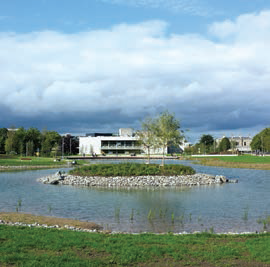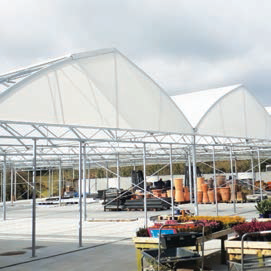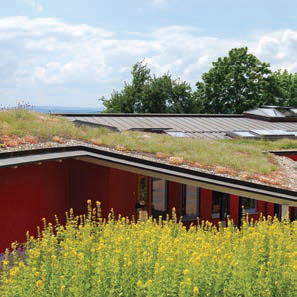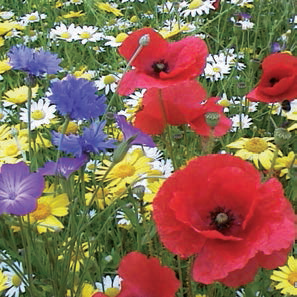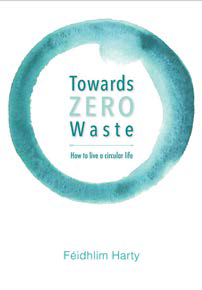Irrigation innovation from Irritec
Until now, if you used a dripline buried under the lawn, the fine grassroots would block the drip outlets within a couple of years. To combat that, Rainbird have developed a dripline with a copper strip within the outlets, which ‘burns’ the root tip and stops the root from blocking the outlet. By irrigating from below, there is zero water wastage. Fertilizers can also be applied through drip irrigation, which is a far safer method than currently used. The next innovation is the use of WiFi control systems. All irrigation systems need a control panel, to start/stop the irrigation zones. The newest models are accessed via a phone app, so you can monitor and make changes from anywhere. The system links to a local weather station and irrigates according to the local weather. Paul Kunckles, of Irritec, says, “This has been the best new product in years. It’s great to see irrigation stopping during wet weather and watering more when it’s hot. An added benefit to my customers is that I can access their irrigation control app from my smartphone also. So if they are unsure about anything, I can check it out.” For more information visit: irritec.ie or call: (01) 840 4033 / (01) 840 5318. ✽ |
Slow the flow with Enrich
In urban areas where green space has been paved over, tarmacked or covered in concrete, the rainfall-runoff is very rapid. A rainfall event in such areas often results in a ‘flash flood’ type effect due to rapid surface runoff. This puts huge pressure on local drainage systems, streams and rivers which inevitably burst their banks causing huge damage socially and economically. The Soil Solution: Soils can absorb and attenuate huge amounts of water, basically reducing and slowing the flow of water after heavy rainfall events. Through soil infiltration, rainfall is incorporated into groundwater and is filtered and cleaned as it percolates through the soil. Enrich offer several specialist soil blends to be incorporated into sustainable urban drainage systems (SuDS) including green roof substrates (pictured), swale soils, Bioretention soils, structural tree soils to name a few. When used, these soil systems slow the flow after heavy rainfall, reduce the risk of flooding, remove contaminants and increase urban green spaces and biodiversity. These systems have a role in complying with schemes such as the Greater Dublin Drainage Scheme (GDDS). Talk to Kevin at Enrich about introducing SuDS soils into your next project. Visit www.enrich.ie. ✽ |
Wildflower growers update
The new wildflowers.ie website and shop will be up and running soon. Once live, customers can enter their garden site details and in return will receive unique recommendations and advice on mixture and species. 2019 was the busiest year ever for wildflower seed. We grow over 300 acres of wildflower on farms throughout Ireland, yet we completely sold out of stock for the first time ever. Unfortunately, the heavy autumn rains destroyed 25% of the 2019 seed harvest, resulting in higher prices for 2020. NATIONAL CAMPAIGNS – We persuaded Supervalu to give away our seed to 3,500 Irish primary schools, for a ‘save the bees’ campaign, along with €50,000 prize money. Included in the seed mixture are species from the newly launched ‘Imithe’ campaign to save rare species. KEELINGS – Having introduced Keeling to integrated pest management with wildflowers around the fruit farm, their PR team took it one step further holding a workshop at Bloom 2019, showing children how to make seed bombs with wildflowers. TIDY TOWN – Councils’ spend increased as they gave away free seed to Tidy Town and resident groups. Tipperary County Council gave away free seed to 1,000 farmers. We funded this with a 50% reduction, as it’s such an important project. We also supplied bespoke seed mixtures to the BRIDE Project, an agri-environment project based in Co. Cork and Waterford. Farmers are realising the value of mixed swards of forbes and grasses. Visit: wildflower.ie for more information. ✽ |
Future students ‘try horticulture’ at National Botanic Gardens
Plants of economic importance like coffee, tea and olives were observed along with the vast array of cacti. Then it was on to a special treat – a walk through the upper gantry in the great palm house, high up in the aerial parts of the “rainforest”. The students observed palm trees and banana plants at a point rarely seen by many people. Next up was a walk through the family beds in the open grounds and up to the nursery area where the students got involved in nursery work. This involved potting-on seedling oaks into larger pots and attaching a cane and fasteners to the plant. They also got to view the wide range of power tools used by students including battery-operated blowers, strimmers, hedge cutters. The college also had its Kubota RTV on the show which is a universal utility vehicle used in a variety of different horticultural environments. The morning event finished with a series of videos about students profiled in the college and enterprises that operate in Teagasc Ashtown where more practical horticulture is carried out. The College will be hosting future events similar to this one. To register for Try Horticulture events, email john.mulhern@teagasc.ie. ✽ |
Hygeia expands organic product rangeLeading Irish garden care supplier, Hygeia, is expanding its nonchemical product range with new additions planned this year. Known for brands such as Green Force, Mosgo, Goulding, Lawn Gold and Nature Safe, the 80-year-old family business is a major industry innovator and quick to adapt to new market trends. “Gardencare is evolving quite quickly with changing customer demands,” says John Coyle, Chair at Hygeia Chemicals. “We are very aware of our need to innovate and to develop nonchemical, natural solutions for today’s gardener.” The development of Lawn Gold lawn fertilizer as an organic-based product and in 2019 the launch of Nature Safe – the only 100% organic plant-based lawn feed and seed fertiliser with no animal by-products, pollinator safe, child and pet safe – is testament to this investment. “Nature Safe is a milestone for our gardencare business,” says John. “We have listened very carefully to our customers and the range of products in our Nature Safe brand from lawn fertilizer to liquid and granular plant feeds as well as lawn patch fix has commenced the journey in this area.” Nature Safe has brought Hygeia into a new area and is now a key business growth driver for the future with new additions planned for 2020. ✽ |
Towards Zero Waste
Says Feidhlim, “Over the past decade, the sheer scale of the problems caused by plastic waste has leaped into our collective awareness. There is a hunger to address the root causes of plastic waste, right back to the point of oil and gas extraction. Patience with government policy and corporate greenwashing is wearing thin. If you, like millions of others, want no part in adding to plastics in the oceans or spreading microplastics into our water, soils and food, then this book is for you.” Towards Zero Waste outlines some of the challenges posed by our waste culture and addresses these directly with straightforward recommendations and ideas for creating a more sustainable life. Feidhlim Harty is a writer and director of an environmental consultancy company specialising in reed bed system design and other eco-friendly sewage options (wetlandsystems.ie). He is author of three other titles, including Permaculture Guide to Reed Beds; a how-to manual for DIY reed beds and constructed wetland systems. ✽ |
Bayer Valdor Flex® – A preventative approach to weed controlThe weed season is fast approaching with temperatures on the rise, so amenity contractors need to be prepared to tackle weeds head-on. Greg Collins, Bayer’s national account manager for Ireland, provides a step-by-step guide to keeping on top of weeds safely and effectively in public spaces. STEP ONE – Assess the area you are treating: The initial step is to assess the surrounding area and undertake an environmental assessment. Contractors should then develop an approach which is safe, while still offering successful control. It’s also important to consider the problematic weeds you are targeting and ensure your approach will control these effectively. STEP TWO – Cultural controls for weed control: Cultural controls should form the basis of any weed control programme as they offer a non-chemical solution to getting on top of weeds that are already present. Hand weeding is one way to remove established weeds, alternatively strimming or mowing can be used, and while it’s a process that has to be repeated regularly, it does keep the area clean and tidy. STEP THREE – Preventative approach to weed control using Valdor Flex®: A preventative approach to weed control can help amenity contractors keep on top of weeds before they appear. Valdor Flex® is a pre-emergence herbicide that prevents a broad spectrum of weeds from emerging, up to four months, reducing the frequency of traditional herbicide applications. The product provides excellent residual control for even the hardest to manage weeds on a wide range of surfaces, including open soil, gravel and industrial areas. The combination of two active ingredients in Valdor Flex®, diflufencian and iodosulfuron-methyl-sodium can help to minimise the risk of resistance with two different modes of action. Valdor Flex® is also available in a range of pack sizes. The 10g sachets are the ideal dose to be mixed in a knapsack sprayer with 10 litres of water. However, the 500g bottle may be more cost-effective to use in a tractor-mounted sprayer. STEP FOUR – Residual control if weeds are already present: If weeds are already established, Valdor Flex® can be mixed with RoundUp® to provide initial knockdown, while Valdor Flex® provides residual control preventing subsequent weeds emerging for up to four months. STEP FIVE – Continue to monitor for weed re-growth: Even once weeds are under control, it’s important to monitor the area closely and if re-growth can be seen, then a preventative approach should be taken to keep on top of weeds in public spaces. When to use Valdor Flex®? It can be applied between February and June, with a single application per season. ✽ |



